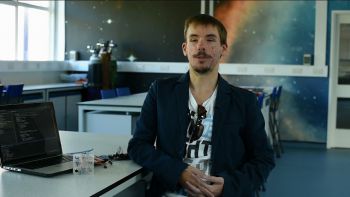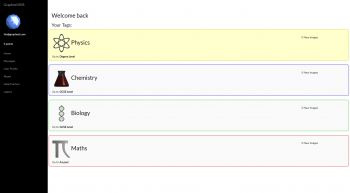New service helps blind people to access science courses
Posted on behalf of: University of Sussex
Last updated: Monday, 17 July 2017

Daniel Hajas (pictured) has created an app that will make it easier for visually impaired people to study science.

The Iris app allows blind people to upload complicated graphs and diagrams to an online system and get them described by sighted experts.
A blind student at the University of Sussex has developed a new app that will make it easier for visually impaired people to study science.
The Iris app allows blind people to upload complicated graphs and diagrams to an online system and get them described by sighted experts around the world – helping make science courses more accessible.
The ground-breaking app was developed by Daniel Hajas, who went blind at the age of 16, and a team of fellow students at Sussex and Portsmouth universities.
Daniel, who has just completed a Masters degree in Theoretical Physics, normally uses screen‑reading software, but found that this technology couldn’t decipher the complex scientific material he came across in his degree.
He explains: “I’ve managed to achieve good grades so far, but it’s been difficult and other blind students might have given up by now.
“I don’t know of too many blind people who’ve become scientific researchers, and this might be because they are not getting the right help.”
Apps that connect blind people with sighted volunteers already exist – but Iris is the first service that is specifically designed to pair blind students with scientifically-trained volunteers.
The app has already built up a network of sighted experts from countries across the world, including volunteers from Brazil, Australia and New Zealand, although Daniel’s team is looking for many more people to give their time to the project.
The 23-year-old, originally from Hungary, has high hopes for the future of the technology – he and a team of fellow students are working on an update that could see the service embedded into websites across the internet.
Tim Lingard, a PhD student who has been working alongside Daniel, says: “I think everyone should have access to scientific material.”
“This is not just to learn about how our world works, but also because a scientific mindset comes in useful in all walks of life.”
Daniel first came to Sussex as an undergraduate student in 2013. After finishing his Masters course, he’s looking forward to starting a PhD at the University in September.
Daniel says: “When I decided to do a Physics degree, many people told me I wouldn’t be able to do it, but I’m happy to have proved them wrong.
“A big part of my success so far has been down to the help I received from the Physics department at Sussex, and from the wider University community.”
Daniel is currently seeking charity status for his organisation, Grapheel, which aims to make science subjects more accessible to blind people through Iris and other projects.
The enterprising student so far received £5,000 in funding towards Grapheel from Michael Chowen CBE DL, a local businessman and Consort of the High Sheriff of East Sussex, which was matched by £5,000 from the bank Santander.
He has also received support from the Sussex Innovation Centre, an innovation hub based on the University’s campus, which has provided him with a year’s free virtual membership and £500 in funding towards the project.
If you’re interested in participating in Iris, or would like to know more about the other initiatives that Daniel and his team are working on, visit the Grapheel website.
